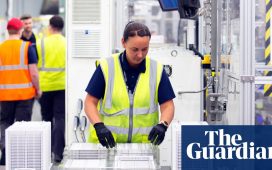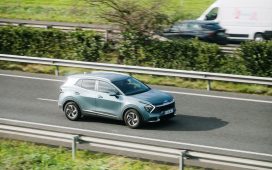Is there anything in the automotive world as British as Jaguar and Land Rover? We think not. These brands have been in the upper echelon of all things British motorcars for years. With a knack for designing timeless vehicles, JLR is in a good spot.
Or so that may appear. As with most car companies, they are controlled by a higher power, in most cases, a parent company. Those in charge of Jaguar’s Land Rovers goings-on is a company called Tata Motors. Tata is an Indian-based giant that has had its fingers in numerous automotive pies over the years.
Alongside the cars, they own the biggest tea company in the world, India’s second-largest steel manufacturer, and a hotel group. They’ve got a lot of money. However, right now, they are asking Jaguar Land Rover for a buy-out if they wish to keep their operation solely in the UK. Leaving the UK government with an ultimatum; pay us $600 Million, or we move some of the production to Spain.
Who Owns Jaguar Land Rover?
The Tata Group is an Indian-based industrial conglomerate founded in 1868. Their founder Jamsetji Tata was considered the father of the Indian industry and led his company to be the biggest business conglomerate in India with an estimated value of $311 Billion. In 2008 Tata Group changed the name of its motoring division from TELCO to Tata Motors.
Tata Motors began with a purchase of Jaguar Land Rover from then parent company Ford Motors. The fee at this time was a cool $2.3 billion. The deal included all intellectual property, a significant pension contribution, and a promise of no major changes to company personnel.
In the coming years, Tata Motors would come to have s somewhat significant presence in Spain, purchasing the bus and coach builder Hispano Carrocera, based in Zaragoza, Spain. The brand became Tata Hispanico which then closed due to mismanagement in 2013. Now, Tata could be forced to move some of its business back to Spain against Jaguar Land Rover’s will.
How Much Is Jaguar Land Rover Worth?
As it stands in 2023, Jaguar Land Rover has an estimated net value of around $30 billion. This figure includes all of their assets and factories. The brand continues to build and test cars in Solihull, a small city in the heart of the British midlands, a place where that holds strong historical significance for the British motor industry.
By far, the biggest and most profitable product is, of course, Range Rover. The brand accounts for most of JLR’s revenue stream as it has built itself a name for the benchmark in luxury SUV design. Despite a couple of years of struggling severely due to the microchip shortage, it seems that JLR is back on the up.
The delays in production halted the incredibly popular Defender as they prioritized the few chips they had for the most expensive full-sized Range Rover. The next move for Jaguar Land Rover is changing and transitioning its brand focus towards electric vehicles. The UK government has been pushing the auto industry to do this, and Tata Motors wants to get on the front foot with battery production.
Is Jaguar Land Rover Based In The UK?
So, as it stands, Jaguar Land Rover has all its eggs in one basket. They are the UK’s largest car manufacturer. Their builds are split between the main plant in Solihull and a second plant in Slovakia that builds only the Defender and Discovery models. The case in point here is Tata asking the UK GOV for around $600 million in state aid towards the build of a new battery factory in England. If not, Tata will build it in Spain.
A report from the Financial Times says Tata’s big-wigs have given the government weeks to pledge their support. The appeal aims to obtain grants and support packages like subsidies for energy costs and funding for battery research. The government is in a tight spot. JLR is the by far the largest employer in the UK’s manufacturing industry, and it has just recently started making money again.
Failure to build the new factory would incur the loss of thousands of jobs, both new and existing. Tata is latching on to the UK’s troubles in transitioning from ICE vehicles to EVs. Not getting the new battery factory build could mean a significant long-term issue to not only the UK’s auto industry, but it could make international investment cease.
The UK has struggled to attract significant investments from automakers as they pursue EV battery technologies. Auto production in the country stooped to an all-time low after a huge Honda factory closed. The government has agreed to an alleged £850 million put towards battery manufacturing. £100 million went to Nissan, and the Stellantis group received £30 million. More likely than not, the UK government will have to bite the bullet and strike a deal with Tata. In the current economic climate, not doing so could be a disastrous move.
Sources: AutoBild, FT, JLR, TataMotors















